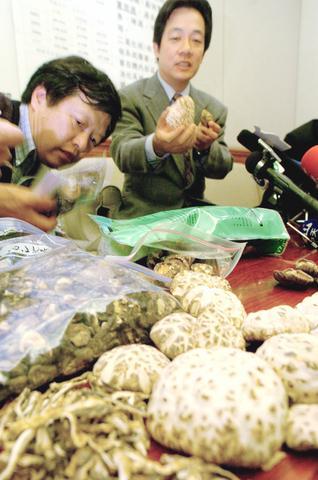Nearly 300 tonnes of dry oak mushrooms grown in China have been imported from a third country in the last three years, and health authorities should tackle the health risk, a legislator said yesterday.
Democratic Progressive Party Legislator Lai Ching-te (賴清德) yesterday released customs records of imported dried mushrooms from 2002 to this year, saying they were inconsistent with those of exporters.

PHOTO: SEAN CHAO, TAIPEI TIMES
In the last three years, customs documents show that the nation has imported 252 tonnes of dry mushrooms from Japan, but records there indicate only 15 tonnes were exported. Similarly, during this period of time, Taiwan imported 64 tonnes of the mushroom from South Korea, but export records there only account for 18 tonnes.
"We suspect that Chinese oak mushrooms make up the gaps. Ironically, we don't see health authorities actively checking these goods, which are easily available on the market and might jeopardize consumers' health," Lai said.
Lai said lax regulations in China made the quality of Chinese agricultural products inferior to other countries. He also added that two years ago, Japan detected residues of toxic dichlorvos at levels 28 times higher than what is acceptable on produce imported from China.
China's food safety regulations are far lower than those of its neighbors. Farmers there are permitted to use preservatives such as formaldehyde.
In addition, Singapore and Hong Kong also reported exceedingly high levels of heavy metals and pesticides in mushrooms imported from China, Lai said.
Lai also said Chinese farmers often add sulfur dioxide or formaldehyde to keep mushrooms pleasing to the eye, but these chemicals pose a threat to human health.
Responding to Lai's claims, officials at the Department of Health said regular examinations of imported items are carried out by the Bureau of Standards, Metrology and Inspection under the Ministry of Economic Affairs.
According to Hsiao Tung-ming (蕭東銘), deputy director of the department's Bureau of Food Safety, in recent years, the government has not found levels of chemicals exceeding national standards in imported dry mushrooms.
"Consumers should be confident of governmental practices in ensuring food safety," Hsiao told the Taipei Times.
Hsiao also said that if agricultural goods failed to meet the nation's food safety regulations, more comprehensive checks are conducted.
In related developments, local mushroom farmers who face competition from imported mushrooms urged the government to protect their livelihoods.
"We are afraid that suspicious Chinese mushrooms coming into Taiwan can beat local products due to their unbelievably low prices," said Chen Tsung-ming (陳宗明), director-general of the Taiwan Mushroom Research and Development Association.
According to Chen, the price of high quality Korean mushrooms declared at customs in Taiwan is only 13 percent of what it costs in South Korea.
Taiwanese mushrooms cost NT$750 per kilogram, but Japanese mushrooms only cost NT$320 per kilogram.

A preclearance service to facilitate entry for people traveling to select airports in Japan would be available from Thursday next week to Feb. 25 at Taiwan Taoyuan International Airport, Taoyuan International Airport Corp (TIAC) said on Tuesday. The service was first made available to Taiwanese travelers throughout the winter vacation of 2024 and during the Lunar New Year holiday. In addition to flights to the Japanese cities of Hakodate, Asahikawa, Akita, Sendai, Niigata, Okayama, Takamatsu, Kumamoto and Kagoshima, the service would be available to travelers to Kobe and Oita. The service can be accessed by passengers of 15 flight routes operated by

Alain Robert, known as the "French Spider-Man," praised Alex Honnold as exceptionally well-prepared after the US climber completed a free solo ascent of Taipei 101 yesterday. Robert said Honnold's ascent of the 508m-tall skyscraper in just more than one-and-a-half hours without using safety ropes or equipment was a remarkable achievement. "This is my life," he said in an interview conducted in French, adding that he liked the feeling of being "on the edge of danger." The 63-year-old Frenchman climbed Taipei 101 using ropes in December 2004, taking about four hours to reach the top. On a one-to-10 scale of difficulty, Robert said Taipei 101

MORE FALL: An investigation into one of Xi’s key cronies, part of a broader ‘anti-corruption’ drive, indicates that he might have a deep distrust in the military, an expert said China’s latest military purge underscores systemic risks in its shift from collective leadership to sole rule under Chinese President Xi Jinping (習近平), and could disrupt its chain of command and military capabilities, a national security official said yesterday. If decisionmaking within the Chinese Communist Party has become “irrational” under one-man rule, the Taiwan Strait and the regional situation must be approached with extreme caution, given unforeseen risks, they added. The anonymous official made the remarks as China’s Central Military Commission Vice Chairman Zhang Youxia (張又俠) and Joint Staff Department Chief of Staff Liu Zhenli (劉振立) were reportedly being investigated for suspected “serious

Taiwanese and US defense groups are collaborating to introduce deployable, semi-autonomous manufacturing systems for drones and components in a boost to the nation’s supply chain resilience. Taiwan’s G-Tech Optroelectronics Corp subsidiary GTOC and the US’ Aerkomm Inc on Friday announced an agreement with fellow US-based Firestorm Lab to adopt the latter’s xCell, a technology featuring 3D printers fitted in 6.1m container units. The systems enable aerial platforms and parts to be produced in high volumes from dispersed nodes capable of rapid redeployment, to minimize the risk of enemy strikes and to meet field requirements, they said. Firestorm chief technology officer Ian Muceus said